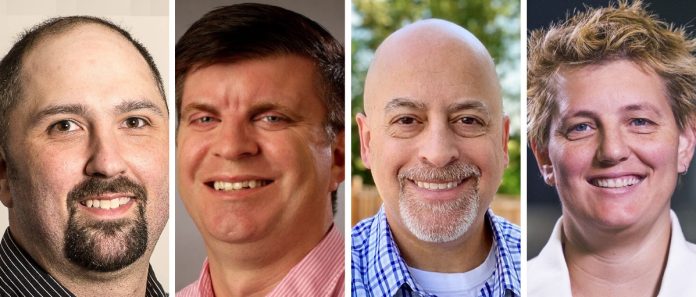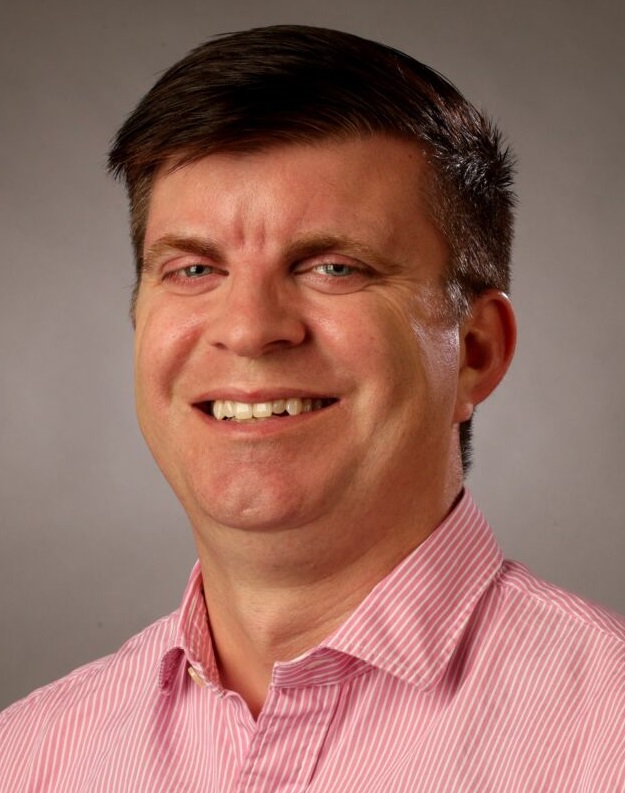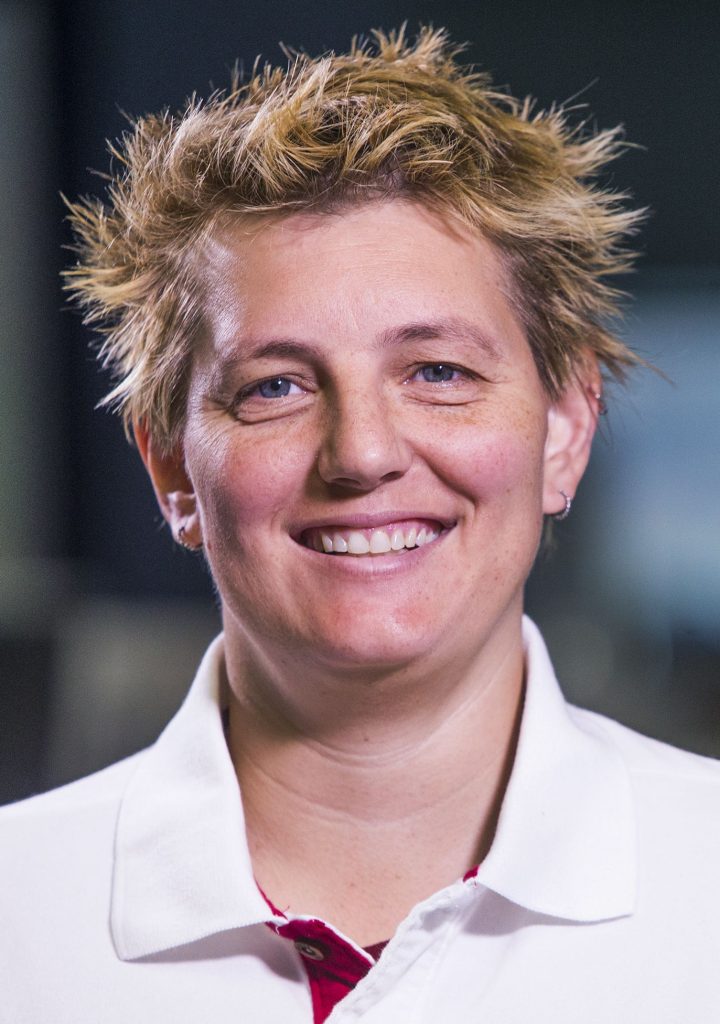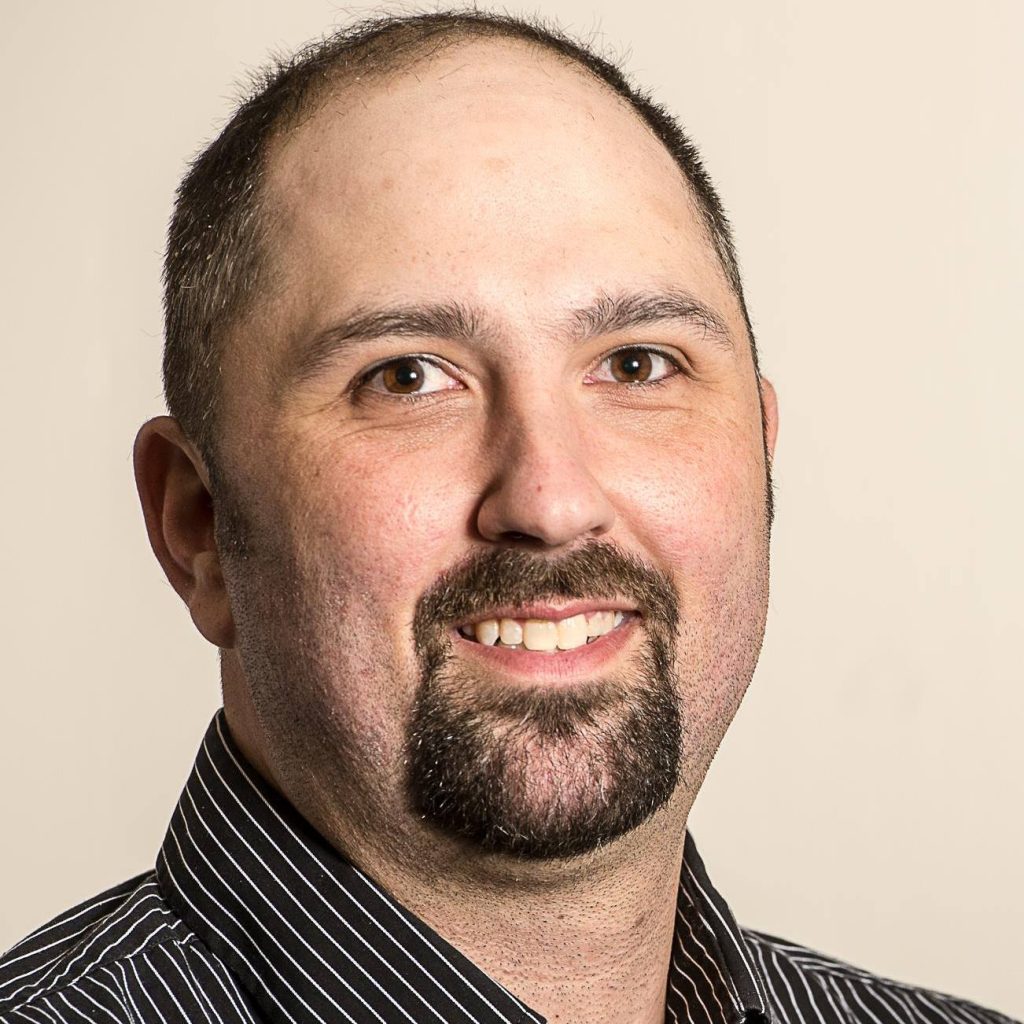
APSE Members,
The election period for APSE second vice-president is open. The deadline to vote is 11:59 p.m., Friday, April 21. Each member organization that has paid 2023 dues has one vote. For those organizations with more than one member, please confer and cast one consensus vote.
The second vice-president serves a three-year term, moving up to first vic- president in Year No. 2 and APSE president in Year No. 3.
The second vice-president will assume office at the closing meeting of the summer conference in July.
Please email your vote to executive director Bill Eichenberger at billapse707@gmail.com.
Bios of the four candidates — Paul Barrett, Erik Hall, Emily Horos and Justin Pelletier — are in alphabetical order below.
Paul Barrett
Current position
Sports Editor, The Seattle Times
APSE Experience
- I’ve been an APSE member since 2015 and became more involved after being promoted to sports editor in 2016.
- My first year judging the contest was in 2017. I’ve done that every year since and have been a regular summer-conference attendee since then (except in 2021 because of COVID).
- I’ve also been active in Northwest regional meetings, served as a mentor in the mentorship program and have been on the diversity, contest, scholarship and membership committees.
- Since I joined The Times in 2015 we have won three Grand Slams, two Triple Crowns and multiple digital and writing awards in the contest.

Journalism Background
I started my first full-time newspaper job in 1989 as a preps reporter at the Moscow-Pullman Daily News, while also a full-time student at Washington State University. Since then I’ve worked at daily newspapers of all sizes in various areas of the country as a reporter, editor, designer and manager, including stints as night sports editor at The Arizona Republic and Miami Herald. Those experiences gave me a broad sense of perspective, and I can appreciate the challenges faced by APSE member organizations of different sizes and will work to ensure we are serving the needs of its whole membership.
I returned to my native Seattle in January 2015 as an assistant sports editor in charge of pro sports coverage (right as the Seahawks were headed to their second consecutive Super Bowl), and in August 2016 I was promoted to sports editor. I manage a department of 23 people in the West Coast’s second-largest newsroom, and I’m responsible for overseeing daily coverage of six pro teams and two Division I universities.
I’m very invested in The Times’ commitment to diversifying the industry and our newsroom. I’ve been a member of AWSM since 2019, and I have mentored many young journalists of diverse backgrounds over the years. I’ve also served as a mentor in both the company and newsroom mentorship programs.
Objectives
I’ve been fortunate to experience how valuable APSE can be – whether it’s networking, problem-solving or sharing best practices – and if elected I would consider myself a steward for the organization and its members. I would look out for the best interests of APSE while being committed to growing the organization and furthering its objectives – especially with making our initiatives more inclusive and accessible to all who are interested. Continuing to invest in diversity efforts and engaging college students are examples that come to mind. We’ve made progress in these areas, and if elected I would not start my term by pushing for changes. Instead I would listen to and collaborate with officers and members to help determine APSE’s best direction, and I would work hard to accomplish our goals.
Quotable
“Surround yourself with the right people.” You no doubt have seen this quote, but it’s a major reason we have been among the nation’s best sports departments over the years. I am continually amazed, but not surprised, by the great work done by our staff, and I feel fortunate to be along for the ride. I’ve realized it’s important to surround yourself with people who are more creative, smarter than you (admittedly a low bar to clear for me) and those who are willing to give honest feedback – even if it’s not what you want to hear.
Erik Hall
Current position
Digital Sports Editor, St. Louis Post-Dispatch, Lee Enterprises
APSE Experience
- Southeast Region vice chair and chair (2019-23)
- APSE Diversity Fellowship (2015-16)
- Oversaw the APSE Student Contest (2020-22)
- Write the monthly APSE On The Move (2017-present)
- Social media management for APSE Facebook account (2016-present)
- Judging member since 2014; Attended summer conference since 2012

Journalism Background
Education: Bachelor’s in Journalism from the University of Illinois-Urbana/Champaign; Master’s in Journalism from the University of Missouri.
Digital sports editor, St. Louis Post-Dispatch (2022-present); Lead producer for sports, USA TODAY Network (2019-22); Digital producer, USA TODAY Network (2018-19); Assistant sports editor, Roanoke (Virginia) Times (2015-17); Assistant sports editor, Columbia (Missouri) Missourian (2013-15); Sports intern, San Diego Union-Tribune (2014); News and sports copy editor, Charleston (Illinois) Journal Gazette/Times-Courier (2012-13); High school sports writer, La Salle (Illinois) NewsTribune (2005-11).
Objectives
I look for the opportunity to continue my service to APSE, an organization that has been incredibly meaningful to my career and growth as a journalist. I want to do everything I can to ensure other sports editors get as much out of the organization as I have. If elected, I look to work with Naila-Jean Myers and Dan Spears to:
1.) Improve the financial footing of APSE. In recent years, the financial report at APSE conventions has been concerning. I’m also a board member with NLGJA: The Association of LGBTQ+ Journalists. When I joined the NLGJA board in 2019, our total cash available was about $500,000. In the past four years, I’ve seen how we have increased our cash total to more than $1.5 million. One of many ideas I have to help APSE diversify its revenue sources and improve financially would be to vigorously pursue corporate sponsorship of events and convention panels from organizations that I have established connections with and know value journalism. I want to help APSE improve its financial stability to continue serving sports editors with education, networking and training opportunities far beyond APSE’s 50th year. The future of APSE is at stake, and strong finances will determine its ability to stay viable as an organization.
2.) Work to improve diversity in the organization. Recent leadership has done a lot of work to increase APSE’s diversity, and I want to help those programs continue to succeed. One responsibility of APSE leadership is deciding where events occur, and it’s a decision that can ensure diverse communities feel welcome to attend APSE events. I want APSE going forward to focus on holding events in states and communities that are welcoming of all people. We can’t grow our organization and improve our diversity if we hold events in states with laws that limit the rights of minority groups. Diversity is vital for the progress and growth of APSE.
3.) Be a solution for editors out of work. One of the most difficult issues in journalism is the staff reductions occurring in newsrooms across our organization. I went through it in Roanoke when my position was one of several assistant sports editor roles eliminated in layoffs that cut 300 jobs across the company. Being a tool to help distribute resumes of those laid off is one objective I would have in APSE leadership. I also want APSE to make it easier for unemployed editors to be able to attend conventions.
Quotable
“Tell the truth and don’t be afraid.”
Emily Horos
Current position
Deputy Sports Editor, The Arizona Republic
APSE Experience
- Joined APSE in 2012.
- Member of the second class of diversity fellows.
- Held numerous region positions, including Southeast vice chair and chair, Great Lakes chair, and West vice chair.
- Active on several committees and regularly attend winter judging and summer conferences.

Journalism Background
Education: Undergraduate degrees from Penn State in journalism and economics; master’s degree from South Dakota State in mass communications.
Worked at newspapers of all sizes from weekly to rural daily to large daily. Journalism experience in five states. Currently the deputy sports editor at the Arizona Republic responsible for NFL and college coverage.
Objectives
Short term: Share the relevancy of APSE to the journalism world. Long term: help the organization find sure footing so that another generation of sports journalists can receive its benefits.
Quotable
We aren’t merely competing to gain pageview or subscriptions. We are competing to win as many seconds of someone’s day as we can. In order to win, we have to show ourselves more valuable than whatever else the consumer could do with that time or money.
Justin Pelletier
Current position
Deputy Regional Sports Editor, McClatchy Southeast
APSE Experience
- Either I or my organization have been a member for better than 15 years, and I have been personally involved for more than 10. I have been to every winter and summer conference (in person when it’s been in person, virtually otherwise) since my first in winter 2013.
- I served two years as Northeast Region vice chair (2016-18), two more as chair (2018-20). I am currently the Atlantic Coast region vice chair, scheduled to become chair this summer.
- I was elected APSE Third VP in 2018, but had to abdicate after being hired at an organization that was too large to fall under the “small organization” umbrella.
- I have served on the contest committee multiple times, and grassroots committee.

Journalism Background
I started freelancing college games for my hometown paper in 1998, while still in school. After graduating with a journalism degree from Boston University and taking a much-needed year off to drive across the country (twice!), I started full time with that same hometown paper, the Sun Journal in Lewiston, Maine, in March 2002. In 2007, while still on the main hockey beat, I received a promotion to Assistant Sports Editor, Online. In 2012, I assumed the role of Sports Editor, and in 2016 I was promoted to Managing Editor for Nights, Sports and Digital. In addition to overseeing sports, I oversaw the nightside operation to include copy desk and pagination, and also the digital department and implementation of digital strategies across the newsroom.
I then spent two years as Sports Editor of the Boston Herald, where we persevered in the face of substantial staff cuts and established a strong digital presence, often leading the newsroom on that end. After a layoff from the Herald, I took my time and found the right fit for me and my family. In February 2021, I started as the Deputy Regional Sports Editor for McClatchy-Southeast, based at the Raleigh News & Observer. I have since served as interim sports editor for both the N&O and The Charlotte Observer as we’ve navigated staffing changes.
Objectives
The sports media landscape continues to see some pretty remarkable shifts in workflow and staffing in the post-pandemic world. In many cases, organizations temporarily shuttered sports jobs as sports themselves shut down, forcing writers and editors into news roles. Companies are merging, consolidating, changing the way we have to operate again.
Sports journalists are among the most versatile and deadline-ready journalists in many organizations, so the transition was a bit easier to handle. But as the sports world has awakened, it’s important to follow how sports departments and other pieces of the organizations return to previous roles and capacities. We’ve learned a lot about covering things from a distance — and so have the teams and organizations we cover. It has been incumbent upon news organizations to stand behind journalists as we’ve returned to arenas and stadiums, ensuring that our access has returned. It should continue to be among our duties at APSE to support member organizations and their right to freely cover teams and leagues, no matter the size and scope. We need to keep a watchful eye on access.
Additionally, the pandemic allowed us to better take stock of how we run our annual contest, and our annual meetings. No one will argue that meeting in person is far better, but what we’ve now been forced to do is manage it remotely. Integrating what we’ve learned by full remote judging and conferences into an in-person or — ideally — a hybrid conference model would allow the inclusion of more members, and perhaps drive membership higher if more people had access to more of what we have to offer.
And as for the contest itself, we’ve made great strides the past few years in digitizing everything from entries to categories. I would look to further expand that reach, and work to fairly represent what it is we all actually do now, with a bent to digital and a nod to print.
Speaking of membership: That we have not bled members during the pandemic is a phenomenal sign. That we ADDED members in the wake of the pandemic is an amazing testament to the people who’ve held offices. The focus has to continue to be retention and addition, and we do that by recruiting younger editors and writers looking to become editors (as I was), continuing and expanding upon the mentoring program, and offering our long-standing members the bountiful reasons to remain involved.
Partnership with members of other important national journalism organizations such as AWSM, NABJ, AAJA, NAHJ, NLGJA, SPJ and others. We’ve made important strides in diversity training, education and hiring, but there is still much left to do. I would look to expand those efforts the best we could, trying to cross-promote and cross-populate our organizations to better assist everyone involved.
Quotable
“Work consists of what a body is obliged to do. Play consists of what a body is not obliged to do.” — Mark Twain.
At the root of what we do, why we all started, is the fact that none of us ever really wanted to “work” for a living. We don’t “have” to do what we do, we “want” to do what we do. And to do it with the companionship of those in our shops, and those in the APSE network, just adds to everything.
Yes, we are all beholden to our jobs, and yes, we all need to earn a paycheck, but down deep, work is play. And what a playground we have.




